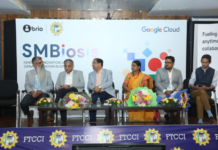‘Enhanced Patient Experience’ is the key focus area today and digital transformation needs to address this explicitly, says Viloo Williams, Chief Information Officer (CIO) & Head – Digital Transformation at Sir H.N. Reliance Foundation Hospital
This is an exclusive interview conducted by Santosh Vaswani, Content Writer & Editor at CIO News with Viloo Williams, Chief Information Officer (CIO) & Head – Digital Transformation at Sir H.N. Reliance Foundation Hospital on “Digital Transformation in the Healthcare Industry”
The Healthcare Industry has gone through a huge overhaul lately, with the help of digital transformation. Digitization has completely transformed the way providers and patients interact and share information. The patient is aware and ‘knowledgeable’ on aspects of his ailments, symptoms, and the treatments available, and he knows his rights well; hence it is of paramount importance that patient data is not distributed carelessly in the quest of digital transformation by the providers or custodians of medical and patient information, said Viloo Williams, Chief Information Officer (CIO) & Head – Digital Transformation at Sir H.N. Reliance Foundation Hospital in an exclusive interview with CIO News.
Today’s patient is very “impatient”, very demanding, and wants everything on his fingertips within minutes and treats a Hospital like a Hotel, she added.
When asked about the role of Digital Transformation in the Healthcare Industry, she said, “Digital Transformation is not about converting paper records to electronic medium”.
Primarily, digital transformation must enable enhanced patient care, improve efficiency, save time for both patients and clinicians, minimize the risk of errors and improve staff productivity.
‘Enhanced Patient Experience’ is the key focus area today and digital transformation needs to address this explicitly. As a way forward, a successful digital transformation will involve making the hospitals “Smart” – Smart Processes, Instant Communication, Smart Connected Devices, and Big-data-driven real-time analytics towards improving both, Hospital Administration and Clinical Outcomes.
When asked about the top technologies to be implemented for a successful digital transformation in the current situation and a way forward, she said, amongst top technologies, in the current situation, Data Interoperability and Tele-Health are the most important and necessary. Tele-Health comprises Telemedicine, Tele-ICU, Tele-Radiology, and a gamut of wearable and IOT devices. All this is driven by high-speed internet connectivity which is mandatory for all of this to work.
Patients want to access their data from anywhere, at any time. Sooner than later, technology will encompass Data Interoperability with high Data Security.
AI, AR, and Mobility have already started playing a major role in many areas of digitization. Technology that reduces waiting time for patients and delivers fast TATs will enhance the patient experience.
Business Analytics platform is another technology area that is necessary for transformation. Without key data insights on Healthcare in both Clinical and Administrative sections, Improvements and Quality are not possible.
When asked how can Digital Transformation deliver a better doctor and patient experience and how can it improve patient care quality, she said, doctors who were averse to digital technology until recently, are now embracing the same especially since the current pandemic. Fast, secure, and personal communication is very important between doctor and patient. This is easily achieved with mobility-driven technologies using video and voice over a secure data-sharing platform of Tele-Medicine.
Within the hospital, doctors and other clinical teams need to focus on patient care without the additional burden of digital data collection; hence it is very important to design the software applications to capture clinical data with very few inputs from doctors and nurses.
- Automate maximum data collection from digitally-enabled medical devices at every stage of the treatment.
- Continuous vitals monitoring of the patient must be captured directly from bedside monitors and smart contact and contactless devices.
- ERs, ICUs, and OTs must be completely automated with data transfer enabled equipment and systems to improve the accuracy of clinical data, reduce errors and improve patient care quality.
- The implementation of artificial intelligence provides benefits in early detection by being able to pinpoint any risk alerts a patient may have.
- Fully automated and transparent service charging, queue management, mobility-driven apps for way-finder and essential services, speedy discharges with integrated TPA approvals, feedback kiosks with speedy communication on redressals are some of the areas that will increase patient experience tremendously.
When asked if digital transformation can help in disease surveillance and preventative management and how, she said, technologies such as Big Data and clinical analytics can play a vital role in helping disease surveillance and preventive management. Artificial Intelligence will play a big role in this. A convergence of AI and Big Data can produce amazing results in health data analytics, and this can help in global epidemic monitoring and control.
Mathematical models and machine learning can analyse huge amounts of data to get clues about the next likely source of infection. AI can identify the ecological and epidemiological patterns that lead up to epidemics to predict outbreaks before they happen.
When asked if digital transformation can help develop effective diagnostic and therapeutic techniques and how, she said, radiology is a classic example of how digital transformation has helped develop effective diagnostic and therapeutic techniques. Smart AI-enabled RIS PACS platforms integrated with state-of-the-art modalities of MRI, CT, Ultrasonography, digital X-rays deliver fast and accurate diagnostic reporting to enable highly responsive treatment.
When asked about the barriers blocking the way for successful digital transformation and steps the healthcare industry must take to overcome these barriers, she said, most critical barrier for the Hospitals is the cost of technology, legacy infrastructure, and expensive skilled resources. Technology is not affordable and so, important steps need to be taken by the “people in power” to enable technology at the grassroots.
Hospitals working in silos, inability to take quick decisions, hierarchical management, and lack of clarity on the scope of transformation are some of the other barriers blocking the way.
She added that successful digital transformation in healthcare means improving the wellness and quality of life for the masses and not just the chosen few.
Healthcare must be affordable and accessible to the masses and digital transformation can help to achieve this with the right mind-set of organizations, which have the power and resources to make it possible. Rural India needs to be brought into focus where healthcare is concerned.
Also read: CIO News interviews Shri Wangki Lowang, Minister (IT) of Arunachal Pradesh
Do Follow: CIO News LinkedIn Account | CIO News Facebook | CIO News Youtube | CIO News Twitter






